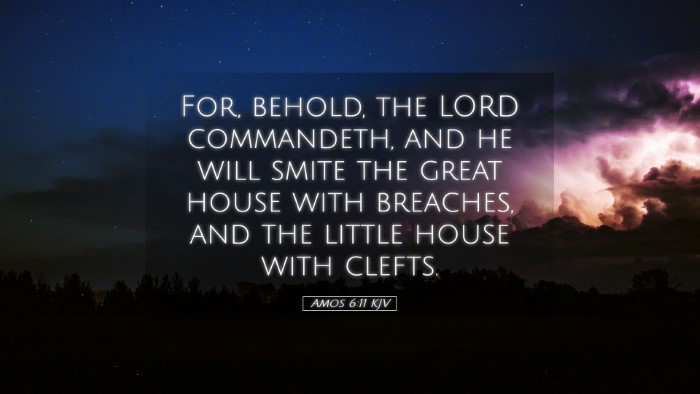Old Testament
Genesis Exodus Leviticus Numbers Deuteronomy Joshua Judges Ruth 1 Samuel 2 Samuel 1 Kings 2 Kings 1 Chronicles 2 Chronicles Ezra Nehemiah Esther Job Psalms Proverbs Ecclesiastes Song of Solomon Isaiah Jeremiah Lamentations Ezekiel Daniel Hosea Joel Amos Obadiah Jonah Micah Nahum Habakkuk Zephaniah Haggai Zechariah MalachiAmos 6:11
Amos 6:11 KJV
For, behold, the LORD commandeth, and he will smite the great house with breaches, and the little house with clefts.
Amos 6:11 Bible Commentary
Amos 6:11 - Commentary and Insights
Bible Verse: Amos 6:11 (KJV) - "For, behold, the Lord commandeth, and the great house shall be smitten with breaches, and the little house with clefts."
Context of Amos 6:11
The book of Amos is a prophetic discourse set against the backdrop of the northern kingdom of Israel during the reign of Jeroboam II. It highlights the social injustices, moral decay, and idolatry prevalent among the Israelites. Amos, a shepherd and fig tree farmer, is called by God to convey messages of impending judgment against Israel. This particular verse arises amidst a series of oracles condemning the complacency of the rich and the injustices faced by the poor.
Commentary from Matthew Henry
Matthew Henry elucidates Amos 6:11 by emphasizing the inevitability of divine judgment. He points out that the phrase "the Lord commandeth" signifies God’s sovereign will and decisive action against both the 'great house' and the 'little house,' representing the leaders and the common people respectively. Henry stresses that no one is exempt from accountability before God; both high and low are subject to His judgment. He notes that the “breaches” and “clefts” signify catastrophic consequences that will befall the houses, reflecting the severity of God's displeasure with the nation.
Insights from Albert Barnes
Albert Barnes offers a detailed analysis of the implications of the judgment foretold in this verse. He interprets the "great house" as indicative of the wealthy and powerful, suggesting that their material security will not protect them from divine retribution. The “little house,” understood as the common dwelling, signifies that all of society is vulnerable to the consequences of sin. Barnes explains that God's judgment is executed universally and not limited to the elite; it serves as a sobering reminder that prosperity does not equate to divine favor. He also points out the metaphorical use of “breaches” and “clefts” as representations of division and destruction within society itself.
Reflections from Adam Clarke
Adam Clarke provides a comprehensive exploration of the verse, delving into the historical context and the metaphorical language used by Amos. He highlights that the "breaches" suggest a divine dismantling of both social structures and personal security. Clarke reflects on the moral and spiritual state of Israel that necessitated such judgment, emphasizing the wickedness leading to the nation's disintegration. He further comments on the sociopolitical implications, suggesting that the impending judgment serves as a cautionary tale for future generations regarding the consequences of oppression and neglect of divine commandments.
Theological Implications
The theological significance of Amos 6:11 cannot be overstated. This verse encapsulates the idea that God is an impartial judge, emphasizing that all individuals, regardless of their status, are accountable for their actions. It also reinforces the concept of social justice within the biblical narrative, highlighting God’s concern for the marginalized and warning against complacency in the face of injustice. Furthermore, it serves as a prophetic call to repentance, urging both leaders and laypeople to reflect on their moral choices and their alignment with God’s will.
Application for Contemporary Readers
For pastors, students, theologians, and Bible scholars, Amos 6:11 presents several pertinent applications:
- Social Justice: The verse affirms the need for social justice and the moral obligation to advocate for the oppressed.
- Universal Accountability: It challenges readers to consider their actions and attitudes toward wealth and power.
- Spiritual Vigilance: The impending judgment serves as a call for spiritual vigilance in maintaining moral integrity.
- God’s Sovereignty: It reinforces the belief in God's ultimate authority over human affairs and societal structures.
Conclusion
Amos 6:11 serves as a poignant reminder of the pervasive nature of divine judgment and the critical importance of justice in human interactions. The insights drawn from foundational commentaries illuminate the verse's depth, encouraging both reflection and action in light of God's command. As society continues to grapple with issues of inequality and moral decay, the message of Amos remains ever relevant, urging a return to righteousness and equitable treatment for all.


